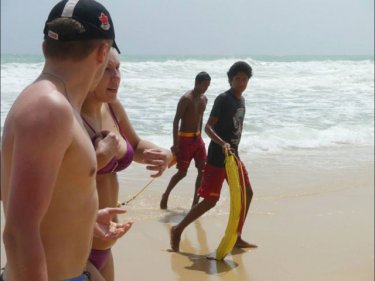PHUKET: A Chinese couple were saved from drowning by lifeguards at Karon beach yesterday - and the lifeguards probably also saved Phuket tourism.
If the Chinese couple had drowned, Phuket's appeal to Chinese visitors would have probably gone under with them.
The couple were taken to Patong Hospital and later allowed to leave.
Drownings of tourists became a weekly event between mid-May and mid-July last year when seven overseas visitors and one Thai tourist from Bangkok drowned on Phuket's popular west coast beaches.
The Chinese Ambassador, Guan Mu, met with Phuket officials on May 29 and made a straightforward plea for a more concerted effort to prevent needless drownings.
Chinese not only drown while swimming on Phuket's beaches but also while snorkelling on day trips off Phuket and Phi Phi.
On Wednesday, a Chinese man was killed when struck by the propeller of a speedboat in scenic Pileh Bay, near Phi Phi.
One day earlier, a Chinese man had drowned on an outing to Racha island, a popular destination about 40 minutes by speedboat from Phuket.
On Thursday, a Belgian man drowned at Phuket's Laem Singh beach and before an hour had passed, a Russian man perished in the surf at Patong.
Remembering the sea rescue of more than 400 tourists earlier this year and a similar if smaller rescue off Krabi more recently, is it any wonder that marine safety has become an issue for the Phuket region?
As the Chinese ambassador said and as Phuketwan has long advocated, all tourists arriving on Phuket should be warned that the sea can be dangerous.
Repetition is required so the message sinks in. New arrivals should be warned at the airport, perhaps via a card slipped into their passports at Immigration.
They should be warned again, directly when they check in by a receptionist. Nothing beats a person to person message, especially in the appropriate language.
And they should be warned a third time, if they venture to the beach and ignore the red flags.
As the lifeguards have said, this is not something that they can do alone.
People who believe they have paid for a swimming holiday on Phuket will be intent on taking that swim, no matter what.
Yes, individuals have a responsibility for their own safety. But Phuket has a collective responsibility to warn people who come to the island in tropical holiday mode.
Everything they experience before reaching the beach indicates to them that Phuket is a delightful place, the sun is shining, and nothing can possibly go wrong.
Having attracted them to spend their money on Phuket, the island must do its darnedest to make sure they get home alive.
We'd like to see meetings organised where resort managements can share their experiences. Some resorts are already ultra-aware places, where the safety of guests is the highest possible priority.
Other resorts take a carefree approach and figure their responsibility ends at the front door. That's no longer the case.
Phuketwan cannot know whether or not the latest drowning victims on Phuket were properly warned by the resorts where they were staying.
But we have named resorts where drowning victims were staying and we intend to keep on naming resorts if we can.
Saving lives is not something the Phuket authorities or resort managements can leave up to the lifeguards. It's a collective responsibility, and it's time the Phuket community understood.










What about the responsibility of the Chinese tourists? Shouldn't they have at least some basic swimming experience before entering the ocean? Red flags are posted daily and ignored. They get into trouble and then expect some one else to jump in and save them.
Posted by Tommy on June 22, 2013 15:19
Editor Comment:
If they have been warned once, warned twice, warned three times, then yes, it's entirely their fault.